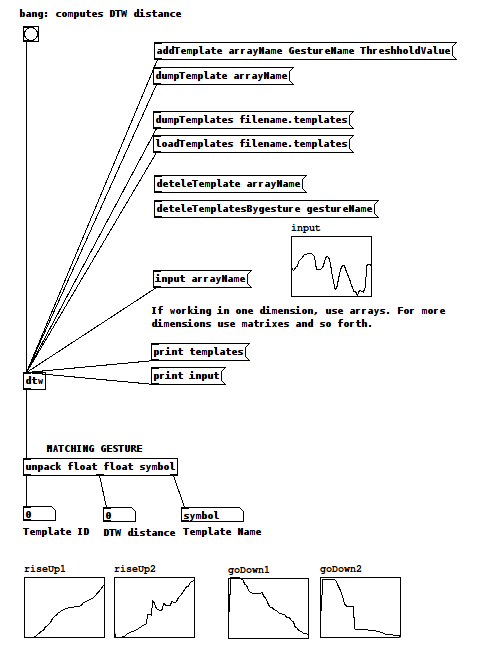mNo edit summary |
mNo edit summary |
||
| (One intermediate revision by the same user not shown) | |||
| Line 2: | Line 2: | ||
Authors: [[User:PedroLopes|Pedro Lopes]] and Joaquim Jorge | Authors: [[User:PedroLopes|Pedro Lopes]] and Joaquim Jorge | ||
Download | Download full paper [[Media:Dynamic Time Warping for Pure Data.pdf]] | ||
We present an implementation of the Dynamic Time Warping algorithm for the [[Pure Data]] programming environment. This algorithm is fairly popular in several contexts, ranging from speech processing to pattern detection, mainly because it allows to compare and recognize data sets that may vary non-linearly in time. | We present an implementation of the Dynamic Time Warping algorithm for the [[Pure Data]] programming environment. This algorithm is fairly popular in several contexts, ranging from speech processing to pattern detection, mainly because it allows to compare and recognize data sets that may vary non-linearly in time. | ||
| Line 12: | Line 12: | ||
Hopefully with the feedback of the community this external can be released in a nearby future, allowing the DTW algorithm to be easily used from within Pd. | Hopefully with the feedback of the community this external can be released in a nearby future, allowing the DTW algorithm to be easily used from within Pd. | ||
<videoflash type="vimeo">36582311|700|400</videoflash> | |||
Early prototype video | Early prototype video | ||
Latest revision as of 14:44, 11 February 2012
Dynamic time warping for Pure Data
Authors: Pedro Lopes and Joaquim Jorge
Download full paper Media:Dynamic Time Warping for Pure Data.pdf
We present an implementation of the Dynamic Time Warping algorithm for the Pure Data programming environment. This algorithm is fairly popular in several contexts, ranging from speech processing to pattern detection, mainly because it allows to compare and recognize data sets that may vary non-linearly in time. Our contribution is easily portable to a wide number of platforms, where Pure Data is available. Throughout this document we describe relevant work that inspired our proposal and present the core concepts of our implementation.
We conclude with an evaluation of our Dynamic Time Warping implementation in two perspectives: performance and adequacy towards gesture recognition. The performance tests suggest that it is suited for realtime contexts, where algorithmic efficiency is of utmost importance. Finally we present a case study where our implementation was used successfully to accommodate gesture recognition on an existing application.
Hopefully with the feedback of the community this external can be released in a nearby future, allowing the DTW algorithm to be easily used from within Pd.
<videoflash type="vimeo">36582311|700|400</videoflash>
Early prototype video <videoflash type="vimeo">11792446|500|320</videoflash>

4th international Pure Data Convention 2011 Weimar ~ Berlin
